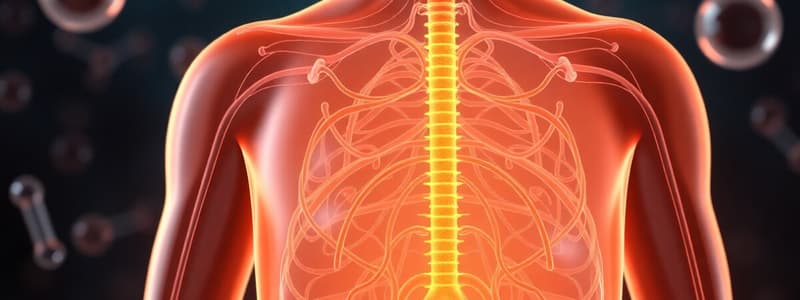Podcast
Questions and Answers
What is the primary effect of cortisol in response to long-term stress?
What is the primary effect of cortisol in response to long-term stress?
- Promotes protein synthesis
- Enhances lipolysis (correct)
- Increases immune response
- Reduces blood glucose levels
Which condition is characterized by excessive cortisol secretion?
Which condition is characterized by excessive cortisol secretion?
- Cushing's syndrome (correct)
- Grave's disease
- Addison's disease
- Hypothyroidism
What are common symptoms of hypocortisolism?
What are common symptoms of hypocortisolism?
- Weight gain and high blood pressure
- Exophthalmos and increased heart rate
- Hyperglycemia and tissue wasting
- Hypoglycemia and fatigue (correct)
What distinguishes T3 from T4 regarding their biological activity?
What distinguishes T3 from T4 regarding their biological activity?
Which of the following could cause hypothyroidism?
Which of the following could cause hypothyroidism?
What is a common characteristic of hyperthyroidism?
What is a common characteristic of hyperthyroidism?
Which hormone is primarily affected in Addison's disease?
Which hormone is primarily affected in Addison's disease?
What symptom is commonly associated with hypercortisolism?
What symptom is commonly associated with hypercortisolism?
Which of the following can lead to a goiter?
Which of the following can lead to a goiter?
What is a key feature of Grave's disease?
What is a key feature of Grave's disease?
What is the result of hypersecretion of growth hormone in children?
What is the result of hypersecretion of growth hormone in children?
Which factor does NOT influence normal growth?
Which factor does NOT influence normal growth?
What is the primary function of parathyroid hormone (PTH)?
What is the primary function of parathyroid hormone (PTH)?
Which hormone aids in the absorption of calcium in the intestines?
Which hormone aids in the absorption of calcium in the intestines?
What is the main outcome of hyposecretion of growth hormone in adults?
What is the main outcome of hyposecretion of growth hormone in adults?
How does calcitonin affect calcium levels in the body?
How does calcitonin affect calcium levels in the body?
Which statement is true regarding the distribution of calcium in the body?
Which statement is true regarding the distribution of calcium in the body?
What stimulates the release of PTH?
What stimulates the release of PTH?
Which of the following describes a hallmark of acromegaly?
Which of the following describes a hallmark of acromegaly?
What is the primary way calcium balance is regulated in the body?
What is the primary way calcium balance is regulated in the body?
Flashcards
Growth hormone & other hormones
Growth hormone & other hormones
These are crucial for normal growth and development. They control the rate of cell division and tissue growth, influencing overall body size and proportions.
Adequate diet
Adequate diet
Provides essential nutrients like protein, vitamins, and minerals necessary for the processes that build and repair tissues, ensuring sufficient growth.
Absence of chronic stress
Absence of chronic stress
Stress hormones can suppress growth processes, leading to slower growth rates and developmental delays.
Giantism
Giantism
Signup and view all the flashcards
Acromegaly
Acromegaly
Signup and view all the flashcards
Dwarfism
Dwarfism
Signup and view all the flashcards
Calcium (Ca2+)
Calcium (Ca2+)
Signup and view all the flashcards
Parathyroid hormone (PTH)
Parathyroid hormone (PTH)
Signup and view all the flashcards
Calcitriol / Vitamin D
Calcitriol / Vitamin D
Signup and view all the flashcards
Calcitonin
Calcitonin
Signup and view all the flashcards
HPA Pathway
HPA Pathway
Signup and view all the flashcards
Cortisol's Role
Cortisol's Role
Signup and view all the flashcards
Cortisol's Metabolic Effects
Cortisol's Metabolic Effects
Signup and view all the flashcards
Hypercortisolism
Hypercortisolism
Signup and view all the flashcards
Hypercortisolism Symptoms
Hypercortisolism Symptoms
Signup and view all the flashcards
Hypocortisolism
Hypocortisolism
Signup and view all the flashcards
Hypocortisolism Symptoms
Hypocortisolism Symptoms
Signup and view all the flashcards
Thyroid Hormone Control Pathway
Thyroid Hormone Control Pathway
Signup and view all the flashcards
T3 and T4
T3 and T4
Signup and view all the flashcards
Goiter
Goiter
Signup and view all the flashcards
Study Notes
Endocrine Control of Growth and Metabolism - Adrenal Glucocorticoids
- Cortisol secretion is controlled by ACTH
- Cortisol is a steroid hormone, synthesized from cholesterol on demand, not stored
- Transported in circulation bound to corticosteroid-binding globulin (produced by the liver)
- Half-life of 60-90 minutes
- Factors affecting release include circadian rhythm and stress
- ACTH, from the anterior pituitary gland, is released in response to CRH (corticotropin-releasing hormone) from the hypothalamus
- Cortisol targets many body tissues and has various effects
Cortisol's Mechanism of Action
- Cortisol acts at the cellular level by binding to intracellular receptors
- This leads to altered gene expression, stimulating transcription, translation, and protein synthesis
- This ultimately affects various physiological processes
Cortisol's Metabolic Effects
- Cortisol's effects are primarily catabolic
- Promotes gluconeogenesis (glucose formation from non-carbohydrate sources)
- Breaks down proteins from skeletal muscle
- Increases lipolysis (fat breakdown)
- Suppresses the immune system
- Causes negative calcium balance
- Influences brain function
Cortisol and Stress
- Cortisol is a key mediator of long-term stress response
Hypercortisolism and Hypocortisolism
- Hypercortisolism (too much cortisol): caused by adrenal tumors, Cushing's disease/syndrome
- Symptoms include hyperglycemia (high blood sugar) and tissue wasting
- Hypocortisolism (too little cortisol): caused by hyposecretion of adrenal steroid hormones, Addison's disease
- Symptoms include hypoglycemia (low blood sugar), fatigue, and lack of appetite
Thyroid Hormones
- Thyroid hormone secretion is controlled by the hypothalamic-pituitary-thyroid axis (HPT axis)
- TRH from the hypothalamus stimulates the release of TSH from the anterior pituitary
- TSH stimulates the thyroid gland to produce T3 (triiodothyronine) and T4 (thyroxine)
- Both T3 and T4 have negative feedback mechanisms that regulate their own production
- T3 is the biologically active form (though T4 is initially produced)
- T4 converts to T3 in tissues and has a longer half-life
- Thyroid hormones affect various metabolic processes, including oxygen consumption
Hyperthyroidism and Hypothyroidism
- Hyperthyroidism leads to an overproduction of thyroid hormones; causes may include Graves' disease, accompanied by exophthalmos (eye bulging) and thyroid gland tumors
- Hypothyroidism occurs due to inadequate hormone production; causes might be iodine deficiency, autoimmune issues, or treatment of other disorders
- Goiters (enlarged thyroid glands) can occur in both hyperthyroidism and hypothyroidism
Growth Hormone
- Factors influencing normal growth include growth hormone, adequate diet, absence of chronic stress, and genetics
- Hypersecretion in children results in gigantism, while in adults it leads to acromegaly (disproportionate growth).
- Hyposecretion leads to dwarfism
Calcium Balance
- Calcium (Ca2+) is vital, acting as a signal molecule, a component of cell junctions, a cofactor in coagulation, and affecting nervous system and muscle function
- Calcium is distributed among extracellular fluid, intracellular compartments, and the extracellular matrix (bone).
- Hormones like parathyroid hormone (PTH), calcitriol (vitamin D), and calcitonin regulate calcium levels in different body compartments through bone resorption, intestinal absorption, and renal excretion mechanisms.
Studying That Suits You
Use AI to generate personalized quizzes and flashcards to suit your learning preferences.
Related Documents
Description
This quiz covers the fundamental aspects of adrenal glucocorticoids, particularly cortisol. It explores the mechanisms of cortisol secretion, its action at the cellular level, and its various metabolic effects. Test your understanding of how cortisol functions within the endocrine system and its role in metabolism.





